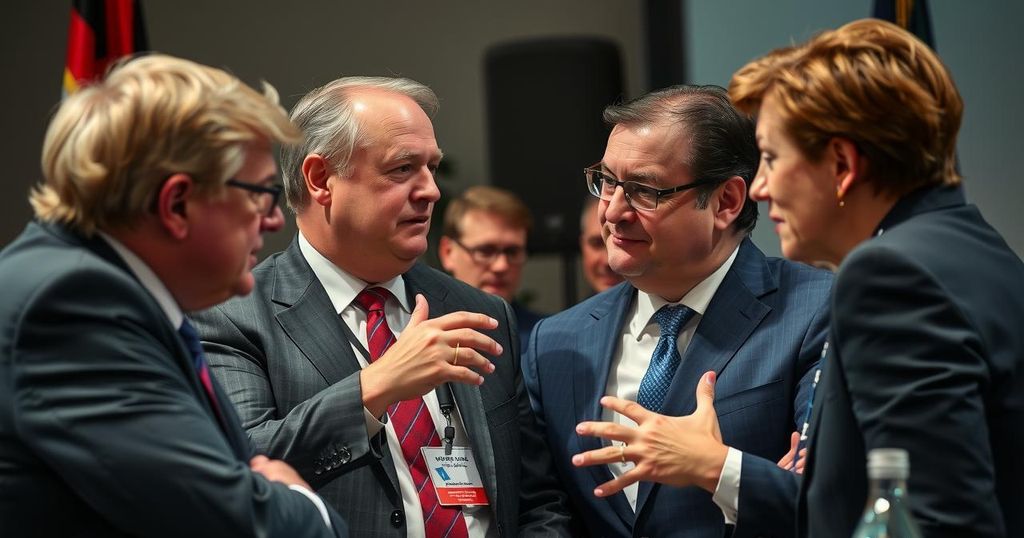World news
AFD, ASIA, BUNDESTAG, CHINA, DEFENSE SPENDING, EUROPE, EUROPE/ASIA, EUROPEAN UNION, FREE DEMOCRATS, FRIEDRICH MERZ, GERMANY, GREEN PARTY, IMMIGRATION POLICY, JO, JÖRG LAU, MEXICO, NORTH AMERICA, POLITICS, POPULISM, PUTIN, REICHSTAG, RUSSIA, SCHOLZ, UKRAINE, VOLKSWAGEN, WORLD WAR II
Sofia Rodriguez
0 Comments
Germany Faces Political Turmoil as Scholz’s Coalition Government Collapses
Germany faces a political crisis as Chancellor Olaf Scholz’s coalition government collapses, leading to snap elections set for February 23. Amidst economic turmoil and rising far-right influence, the need for a unified response is greater than ever. The upcoming elections will significantly impact Germany’s political landscape and require cooperation from all political parties to address systemic issues and maintain democratic integrity.
Germany is currently facing profound political and economic turmoil as the coalition government led by Chancellor Olaf Scholz dissolves amidst a vote of confidence, leading to early elections scheduled for February 23. The Bundestag witnessed unprecedented hostility, with Scholz criticizing his coalition partners for lacking ‘moral maturity’ while opposition figures traded barbs, illustrating the eroded decorum in German politics. This crisis emerges against a backdrop of severe economic challenges, characterized by high energy costs and impending job losses in major industries such as automotive manufacturing, raising alarms about potential long-term ramifications.
Furthermore, the political landscape is increasingly polarized. The far-right Alternative for Germany (AfD) is gaining traction with anti-globalist sentiment, while left-wing factions also show pro-Russian inclinations, complicating Germany’s stance on the ongoing war in Ukraine. This polarization threatens to destabilize the consensus that has historically defined German politics. As Germany prepares for a possible return of Donald Trump to power in the United States, immediate coordination among European leaders becomes imperative to navigate these multifaceted challenges.
In this turbulent environment, the pressing need for substantial government investment emerges; however, the fiscal discipline stemming from the German debt brake has stifled any ambitious spending plans. With the Christian Democrats polling as a leading party, their ability to address Germany’s systemic issues significantly hinges on their willingness to forge coalitions and engender inclusive discourse among rival parties. The upcoming elections represent not merely a referendum on Scholz’s leadership, but also on the very fabric of German democracy itself.
The current state of Germany’s political landscape is characterized by the recent upheaval following Chancellor Olaf Scholz’s coalition government losing a vote of confidence. This incident reflects a shift towards a highly contentious political atmosphere, diverging from Germany’s traditional decorum. Germany is concurrently facing potential economic crises influenced by external pressures, particularly from rising energy prices and the fallout from global trade dynamics, especially with competition from China. Consequently, the political ramifications extend beyond domestic borders, as tensions between European countries continue to mount in light of geopolitical shifts, particularly concerning Russia and Ukraine.
In closing, Germany’s political and economic difficulties bear significant implications for both its internal cohesion and its role within Europe. The approaching elections serve as a litmus test not only for the leadership of the current government but also for the overall stability of Germany’s democratic institutions. A concerted effort among political leaders is essential to foster unity and address the pressing issues at hand in order to secure a sustainable future for Germany and its place in the European Union.
Original Source: www.theguardian.com




Post Comment